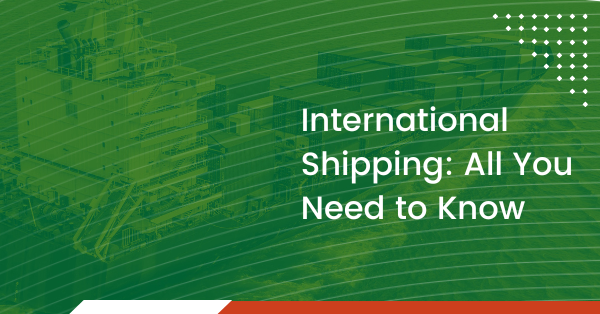Expanding your customer base is an essential step when a business is growing. Many companies start on a local scene, but going global is just a matter of time if the product sells well. International shipping lets you access thousands of potential customers and significantly expands your company’s potential.
What is International Shipping?
International shipping is importing and exporting goods between different countries via ocean, air, or road. International shipping is a complex process of moving freight over borders, accompanied by many rules and regulations. To successfully import or export freight, businesses must know and follow specific policies of international shipping and collect paperwork so your freight passes customs clearance.
International transportation is more intricate than domestic shipments since every country has specific regulations and laws. Some countries have stricter policies than others and completely forbid importing certain products. For example, Canada has a list of prohibited items to import and imposes tariffs on specific goods. That’s why it is essential to learn the regulations or use professional freight forwarding services.
In addition to laws and regulations, time zones, language barriers, and currency exchanges all make international shipping more complex than domestic shipping. However, if you are willing to learn and understand how to ship products internationally efficiently and effectively, you and your customer base will reap the benefits.
How Long Does International Shipping Take?
Depending on the size of your package or freight and the shipping mode, international shipments can take anywhere from two days to four weeks. The fundamental tradeoff when shipping freight is time versus money. Air cargo is notorious for its fast international delivery but is very expensive. On the other hand, moving freight over the sea on cargo barges can take more time but save you money. Usually, the international shipping process consists of five essential components:
- Export Haulage – The freight is moved from its origin to the destination to the next warehouse, port, or facility firm, where it will depart to the border.
- Export Customs Clearance – When the freight reaches the border of the exporting country, it passes the process of clearance before moving to the next stage.
- Transportation – After your load has successfully left the country of origin, the process of transportation begins. This process can vary in time depending on the mode of transportation, freight company, and customer preferences for expedited or standard shipping.
- Import Customs Clearance – When the freight reaches the border of the importing country, it passes another process of clearance. This clearance is an essential part of the shipping process since you must ensure your freight complies with the customs policies of the country you are entering.
- Import Haulage – After successfully clearing the importer country’s border, your freight is moved from the border to its final destination. This process is also referred to as last-mile delivery.
How to Ship Freight Internationally?
It is complex to arrange international shipping, especially if you are doing it for the first time. That’s why most businesses turn to freight forwarding companies to ship their freight. A freight forwarding company specializes in moving products between locations.
Whether you decide to outsource your shipping needs or remain in-house, there are some key things to be aware of to ship internationally successfully.
Collecting Information
While it may seem simple, a crucial step to completing your international freight shipping is gathering all the shipment information and presenting it in the required form. Human error is often a cause of shipping delays. Filling in the documentation and providing the required paperwork shows customers you are a prepared, reliable shipper.
Customs Clearance
The customs clearing process is a critical stage of international shipping. To complete it successfully, you will need a customs broker. These professionals have expertise in arranging and executing global freight movements. You can rely on them to gather paperwork properly and complete the customs clearance process. If you use a freight forwarding company, they will likely recommend a customs broker or even provide one. Check out the US Customs and Border Protection site to find a broker by port and learn more about customs brokers.
Tracking the Result
After the most important part of the process is completed, it’s time to track your shipment to make sure it reaches its final location. Transparent and real-time tracking is crucial for international shipments, so choose a transportation partner that provides seamless and timely updates on your freight. Access to an advanced transportation management system (TMS) will save you time and money while improving overall supply chain and warehouse efficiencies.
International Shipping Rates with PLS Logistics
Having a partner to work with when dealing with international freight is always a good idea. However, a freight forwarding company and broker may not be enough. A third-party logistics company (3PL) is a step above a freight forwarding company with expertise in transportation and logistics. 3PLs can save your business time and money while increasing visibility and overall supply chain efficiency.
PLS Logistics is a 3PL company dedicated to helping your business with its logistics needs. PLS has relationships with 55,000 carriers throughout North America. Our freight brokerage services can arrange international shipping through truckload, rail, ocean, or air. Compare thousands of international shipping rates and choose the best option!
Need to ship abroad? Get Freight Quote today!

